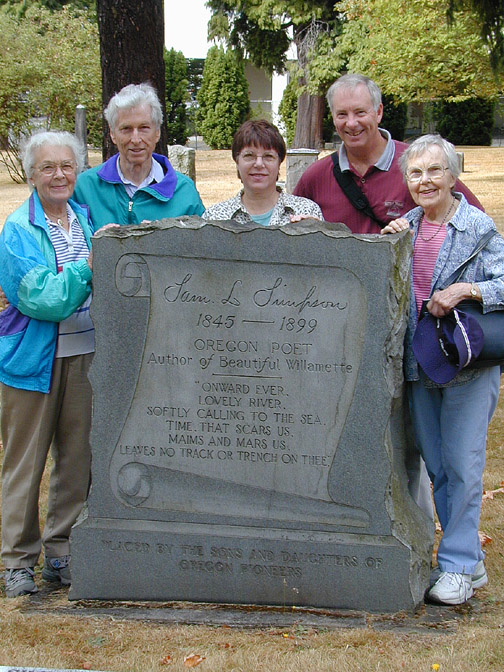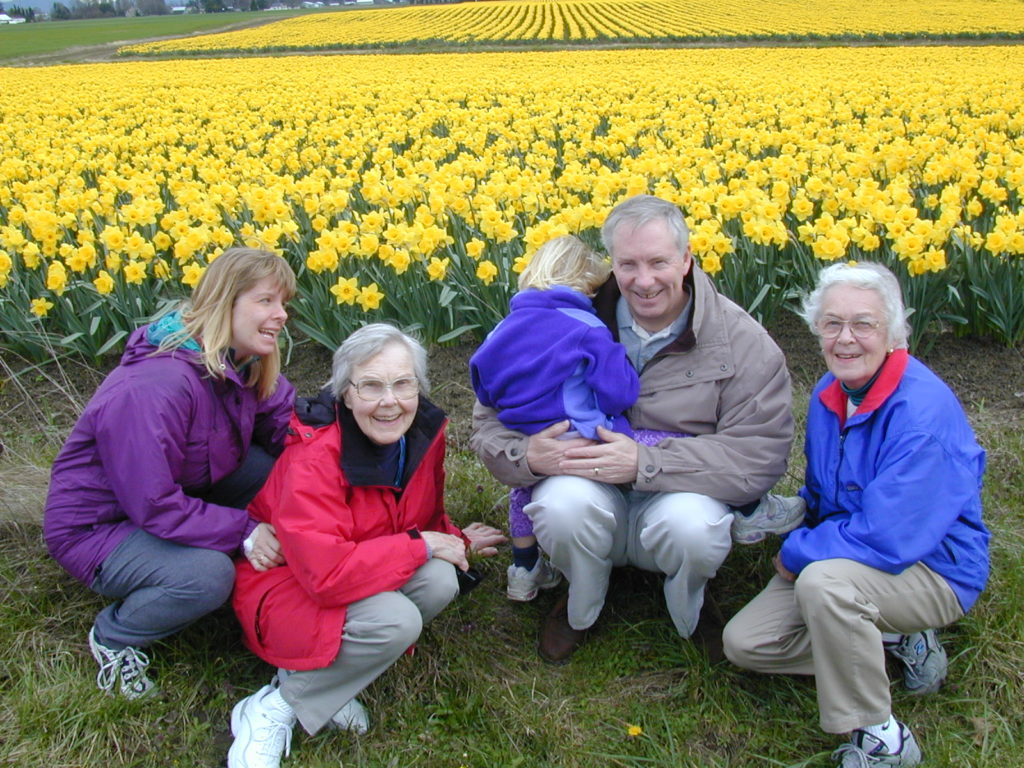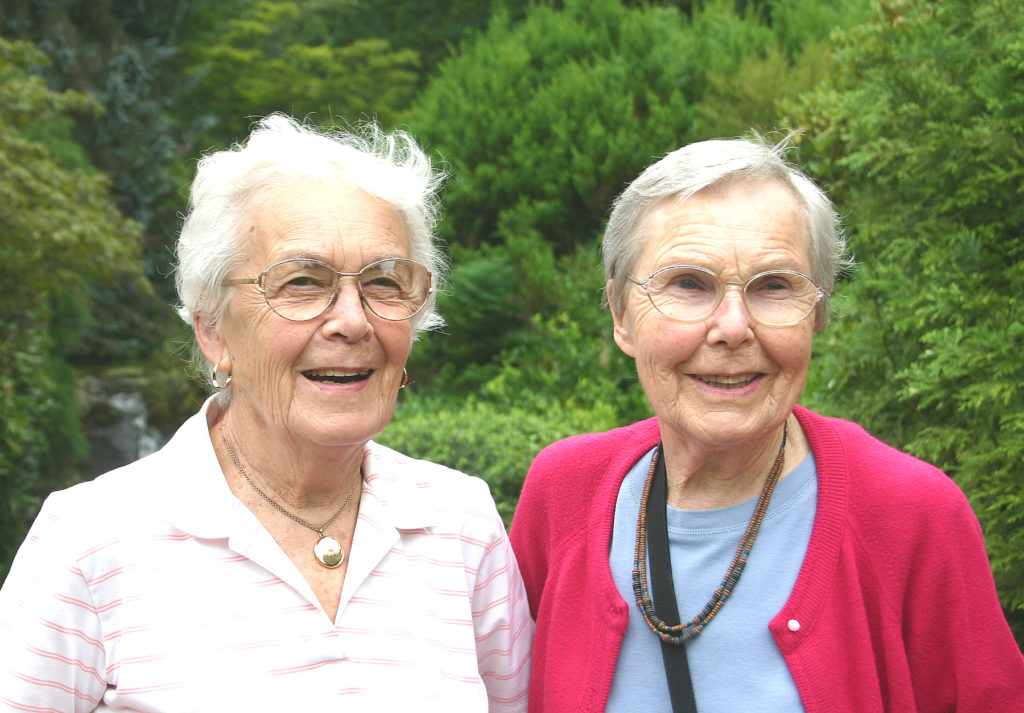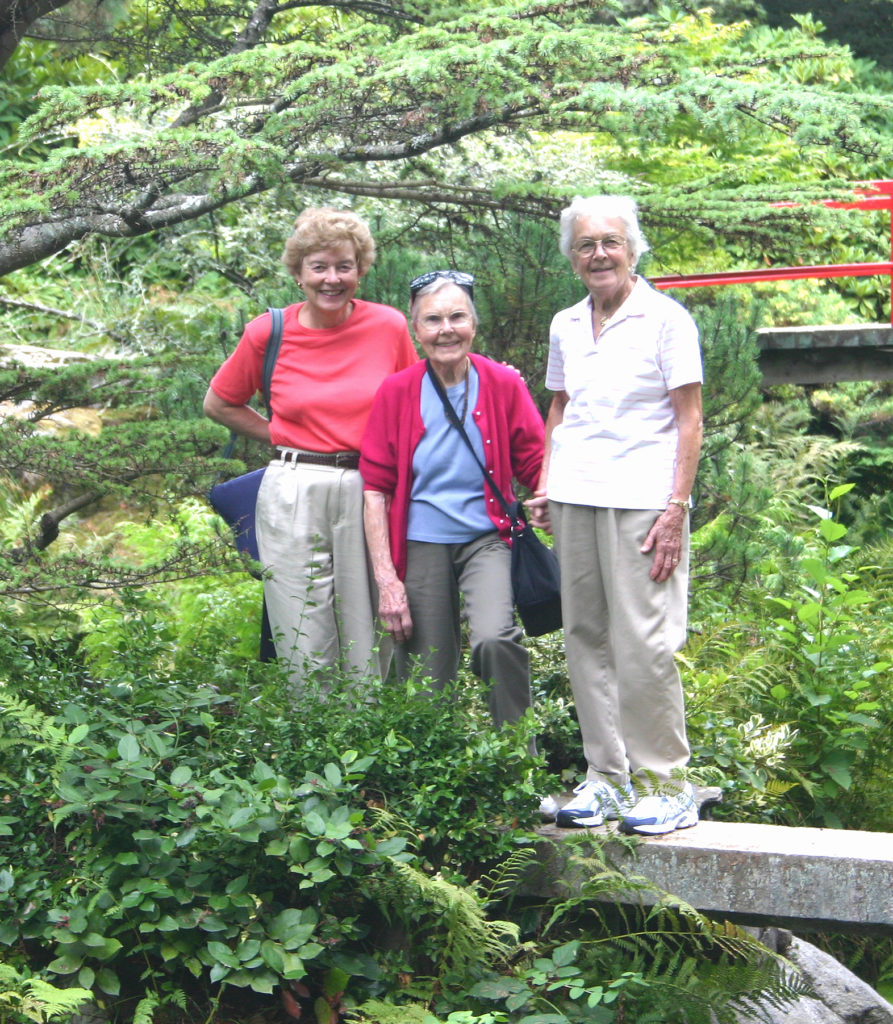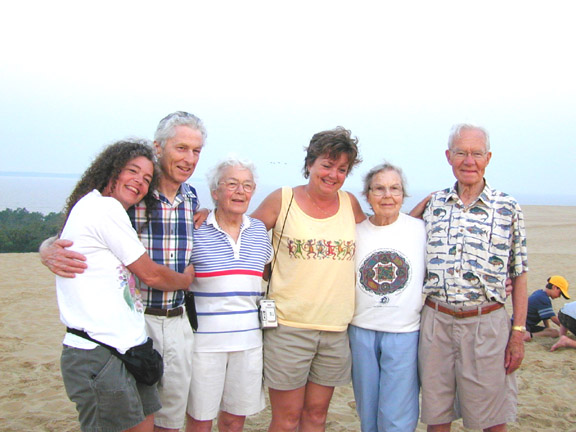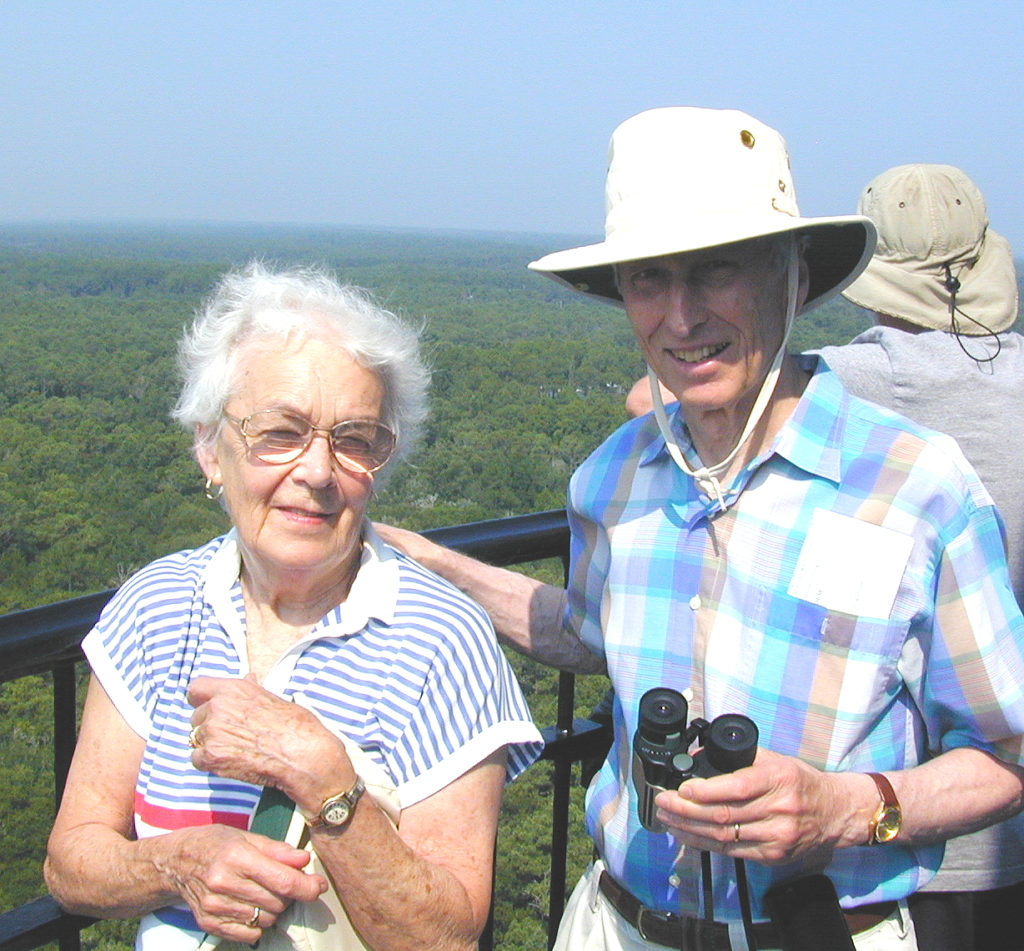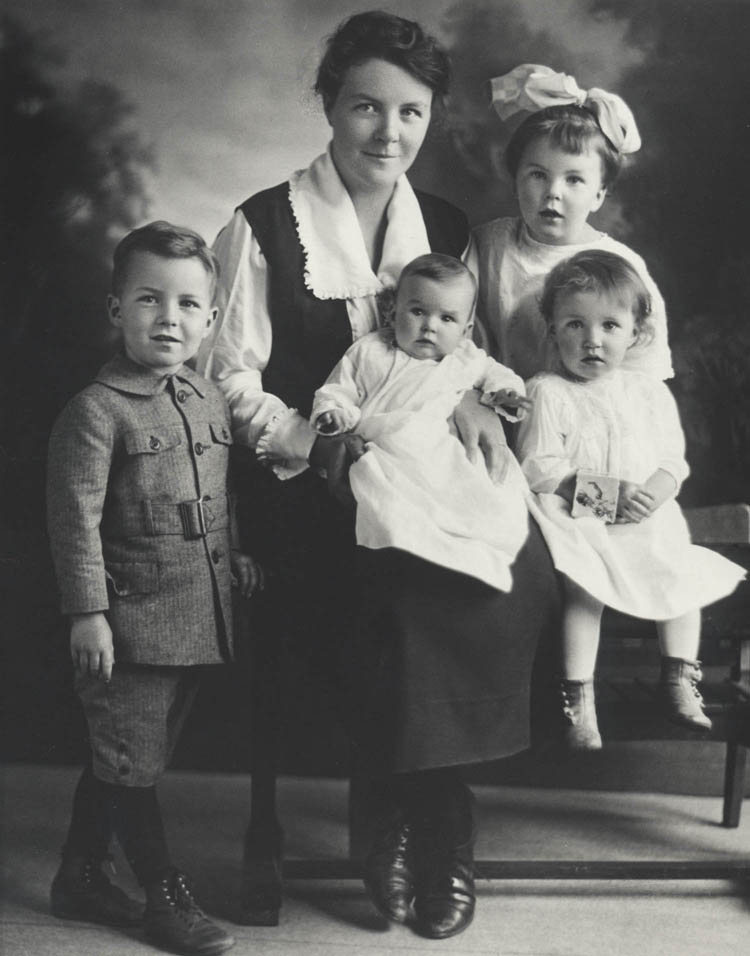
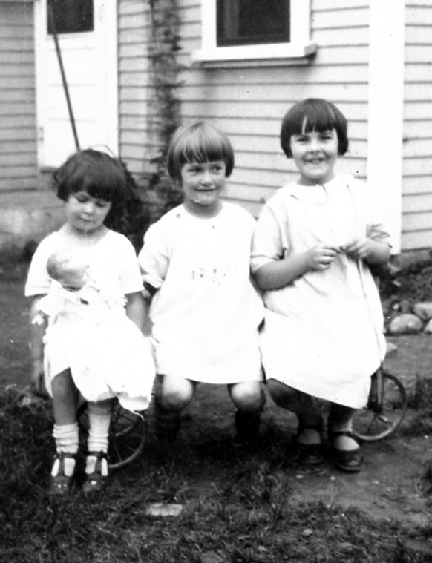
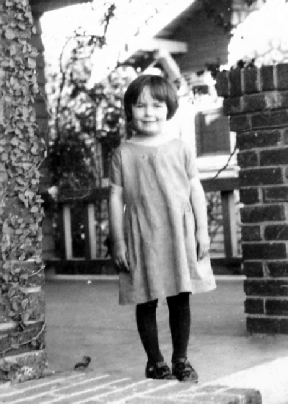
December 22, 1921 to February 3, 2017
Obituary from the Chicago Tribune on February 16, 2017. Provided by Alice Klein.
Jane Beedle Hildebrand , of Hyde Park, Chicago died peacefully at home on February 3, 2017, surrounded by family. She was 95 years old. Jane was born in Berkeley, California , on December 22, 1921, the daughter of Granville Leo Beedle and Carol Simpson Beedle and the fourth child in a loving family of six surviving children. Jane was the dearly beloved wife of Roger H. Hildebrand, professor emeritus of Physics and of Astronomy and Astrophysics at the University of Chicago. They were married in 1944 and had four children, Peter H. Hildebrand, Alice H. Klein, Kathryn J. Hildebrand and Daniel M. Hildebrand; eight grandchildren; and nine great-grandchildren. Jane’s tireless devotion to family and community was a model to all in countless ways. The list of her contributions is long. She was a member of the Ray School PTA throughout her children’s schooling there, serving as both treasure and president; she gave fifty years of service to the University of Chicago Service League; she was a member of the University of Chicago Library Society from 1993; she was a volunteer with the University of Chicago Comer Children’s Hospital Service Committee for fifty-three years, serving as president in 1976-77 and 1987-88; she served as a docent at the University’s Oriental Institute, a place she particularly loved for thirty years, becoming its longest-serving docent emerita; and for many years she was an active member of the Hyde Park Garden Fair. Jane was preceded in death by four of her five siblings. Her brother Richard lives in Desert Hot Springs, California. Jane is survived by her husband, Roger, and her four children, eight grandchildren, and nine great-grandchildren. A memorial service in loving memory will be held at Bond Chapel, The University of Chicago, on Saturday, February 18, at 2:00 pm. In lieu of flowers, donations to The Oriental Institute or Comer Children’s Hospital would be gratefully received.
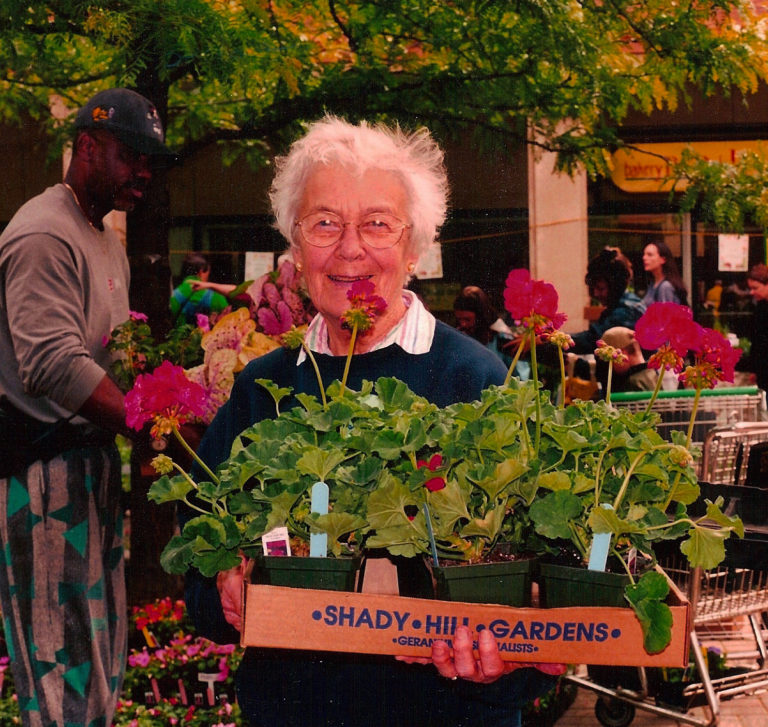
Dan’s (Jane’s son) Remarks at Mom’s Memorial Service – February 18, 2017
Good afternoon and many thanks to all of you for coming today. Many people have contributed stories, memories, and impressions for my remarks, and together these remembrances reflect the enduring threads that ran through our mother’s life.
The outdoors was one of these threads in Mom and Dad’s very loving journey together from the time they first knew one another. They went to Berkeley High School, where they were both honors students. When they were 16, the Honor Society went on a boat trip out in the San Francisco Bay. Dad and his good friend John Bogart sang songs for the entertainment of the other students. Up to now, Mom and Dad had been vaguely aware of each other, but when the singing was over our two honor students found themselves together alone, leaning against the ship’s rails. We know from the photographic record that these were two very cute teenagers, a fact that must not have been lost on either of them.
A few years, and a few long hikes in the Berkeley Hills later, Dad scored an invitation to the Beedle family home at the foot of Mt. Tamalpais in Mill Valley. Dad’s memory of that day is crystal clear. He was mightily impressed. Mom’s family was loving and playful, they kidded around, but they were always kind. Mom and her siblings would rise at 4 in the morning to hike to the top of Mt. Tamalpais to see the sun rise and then gather around the piano and sing songs long into the night—and they were all good singers, Mom not the least of them. This was the girl that Dad fell in love with, and this was the family he knew he wanted to be a part of.
Mom was the fourth of six children who survived into adulthood, and the youngest of the three girls. Thirteen months younger than her sister Gin, she used to laugh about her realization in college that she had come as a big mistake. She always said that she loved her place in the family. She had special relationships with all her siblings. Mom’s surviving brother, Dick, recently commented that he and Jane “were the two cute ones, who generally got away with raising hell.”
Just as Dad became a part of the Beedle family, so too, Mom became ensconced in the Hildebrand family and its traditions. The outdoors was a big part of their lives, too. Dad and his two older brothers, Alex and Milton, had skied most every slope and climbed almost every peak in the Sierras. (Milton, who is with us today, has climbed every last one of those peaks!) With Mom now hiking along with them, it might have been assumed that the pace would slow. Not so!
Dad loves to tell about two college friends who had attempted to climb Mt. Lyle a number of times but never managed to get to the top. They were determined to succeed, and Dad agreed to be their guide. When they met at the trailhead to begin the climb, his friends were taken aback to see Mom with him. Scornful surprise turned to exhausted embarrassment as Mom led the way up and back down the mountain, setting a pace that our two college boys struggled to keep up with. To this day, Dad remarks with great pride that he never had to wait for Mom. Neither did anyone else.
Camping trips were a feature of our young lives, and Peter, Alice, Kate and I remember canoe trips in Canada where we saw not another soul for days at a time, but many moose and bear,. We remember long portages, carrying canoes and belongings overland between lakes. We remember canoe trips down local rivers and streams, sometimes in sleet and snow. Mom was just as much a driver of these expeditions as was Dad.
One of our trips was to Yellowstone. After we arrived, Dad needed to take the car in for service, and Peter and I knew the manly thing to do was to help supervise the tire rotation. We men took off, leaving Alice, Kate and Mom back at camp. Dinnertime was approaching and campers were laying fires, starting to cook their meals. As the aromas thickened, Grizzly bears began to approach, sniffing out what might be in it for them. The other campers headed for the safety of their cars, but with no car to retreat to, Mom continued to cook dinner. The bears began opening neighbors’ coolers, hinge side first, but it became all too clear that Mom’s cooking was far more enticing than the contents of the coolers they were demolishing. Mom’s “momma bear” instincts surged to the fore. She placed the ends of the longest, fattest branches she could find in the fire. The grizzlies’ attention intensified, and Mom responded by speaking their language—she growled! As the standoff continued, the branches in the fire began to smoke and then burst into flame. Alice and Katy took two of the branches, and Mom hefted the largest one. What happened next is the stuff of legend. Suffice it to say that when Men and Car reappeared, we had the campground to ourselves, and the grizzlies grazed at a respectful distance.
The collective memory of our many cousins is of Mom and her sisters and sisters-in-law preparing dinners at family gatherings, talking and laughing in a warm and loving atmosphere. Scenes like these and our own games of kick-the-can on the winding paths at the Mill Valley family home and our flights on the rope swing, sailing over the redwoods and up towards Tamalpais, were an echo of the gatherings of Mom’s childhood.
In retrospect, I suspect that she was always working on some level to recreate the idyllic Beedle childhood she remembered. Her favorite Christmas was one in the early 60s when she gave us board games, a bongo board, a flying saucer, and a bumper pool table. The house was full of children and adults playing games, balancing on the bongo board, spinning one another into senselessness on the flying saucer, and gathering around the piano singing Christmas carols. Years later, I introduced her to those other Beatles. She loved the beat of rock and roll. Another Christmas, I turned on the Beach Boys, and the entire gathering, including Mom, danced the night away. But it was voices singing in harmony, as she and her siblings used to do, that sent Mom’s soul soaring.
Our cousin Carol Jane treasures an image from fifty years ago. The scene is the dining room at 29 Renz Road; afternoon sun streams in the windows. Grandma Beedle, Mom and her two sisters, and Carol Jane are sitting and chatting. This is unusual because typically these women are busy preparing food, hiking Mt. Tamalpais, or working in the garden. Here they are sitting and chatting, and all five of them are knitting.
When Grandma Beedle was dying in 1968, the year that Mom, Dad, and I lived in Berkeley, Mom spent day after day at the hospital by Grandma’s side, knitting an elaborate afghan. She seemed to pour all of her sorrow into that piece.
Mom knitted beautiful sweaters, afghans, baby outfits, and she sewed just as beautifully. A few days after she died, Alice and Kate sent Carol Jane, an expert knitter herself, a large box of yarns, knitting needles, crochet hooks, and a meticulously made sweater needing only a few finishing touches. Two large boxes containing Mom’s inventory of fabric, thread, pins and needles were sent to our cousin Joan, a fabric artist in Wyoming. It is comforting to know that these materials, so expressive of Mom’s creativity, will be used by our cousins, shared with their friends, and disseminated to others, including an alternative school and a knitting group that creates needed items for the community.
Mom loved to make other kinds of things, too. In the early, lean years of her life with Dad, she built bookshelves and night tables out of orange crates, which remain in the house to this day. In those early years, she painted designs on plain glass canisters, turning them into artfully decorated storage containers. She, with Dad at her side, turned an undistinguished late nineteenth-century barn of a house into the beautiful place it is today. The domestic arts were her domain.
My daughter, Sarah, remembers this domestic aspect of her Grandma, and her memories echo those of many others. Sarah loved being in the kitchen with her and what a wonderful cook and baker she was, meticulous and deliberate in the way she put ingredients together. Mom taught her the fine art of rolling out dough. Sarah, a teacher herself, remembers what a good teacher Mom was, guiding and encouraging, correcting and instructing. She learned from Mom how to set the table properly and treasures the closeness she felt sitting next to her. The notes Mom wrote over the years were beautiful, unique, stylish, and quirky, never pretentious or ostentatious, but reflecting an innate sense of style all her own. Some of these cards now hang above Baby Jane’s bed. Her Grandchildren remember her as a strong, independent woman and a supportive and loving wife, a role model of lasting devotion.
Mom was also a problem-solver: she liked figuring things out. Things like exactly how much food we would need for a ten-day canoe trip through the chain of lakes in Quetico Provincial Park and the Boundary Waters. And other things, like what was wrong with the faucet in the powder room, something she diagnosed just a few years ago when she was already well-advanced in Alzheimer’s. She said more than once that in an era more hospitable to professional women, she would have been an engineer, but though the times were changing, that was not to be. She was for the most part an at-home wife and mother and a volunteer in both the University and broader communities. At the same time, she embraced many of the cultural changes in progress during her Chicago years. She read Everything you Wanted to Know About Sex But Were Afraid to Ask, and then wanted to discuss it with Katy and me.
Mom and Dad, once struggling newly-weds, had achieved a near-perfect version of the American Dream. But during the 70s and 80s values were changing and this led to profound questioning of women’s roles. There was a sense that marriage, children, home and community were not enough. The notion that a housewife was JUST a housewife cut Mom to the quick.
Struggling with just what her role should be, Mom solved the problem by becoming more involved than ever. She had long been a member of the Ray School PTA, sometimes president or treasurer. For years she was active in the Garden Fair, and the Service League at Comer Children’s Hospital. She worked for a time as Geography Department secretary, a job she loved. She threw herself into reading every book written on Ancient Middle Eastern civilizations so she could be the best informed docent possible at the Oriental Institute, a place she knew like the back of her hand and loved with all her heart. When dementia set in and she defied our attempts to keep her safely at home, it was to the Oriental Institute that she would retreat, wandering through those spectacular exhibit halls.
In addition to everything else, Mom started running well before it was considered a normal thing for women in their 50s or 60s to do, and she and Dad would often go running together along the Midway. At the age of 70, she entered a 10 kilometer women’s race in Lincoln Park and won her age group as well as the 60-year-old age group. She was disappointed and frankly a bit peeved to discover that her achievement was so unexpected that no award was available to acknowledge her win.
A friend remembers the days in 1977 when she and her family were new to Hyde Park. Mom reached out to welcome them. She was, as this good friend put it, “the soul of the block”—a good neighbor, kind friend, and active Hyde Park community member. Mom always welcomed their children and all the neighborhood children to play in our back yard. The same friend comments that “Jane was the first person I would seek [out] for help …or advice. She was gentle, intelligent, firm, wise and egalitarian. I admired her commitment to our neighborhood, the Children’s Hospital, environmental issues, and human rights, especially the plight of Native Americans. Our neighbor says: “She was goodness incarnate; that’s the Jane I knew and we sorely miss her!”
Mom once said she thought she’d been born under a lucky star; she’d been put on this earth to have fun. My sister Alice heard her say this perhaps fifty years ago, and has remembered it ever since. It’s so simple and optimistic. Mom once told me that she had only wonderfully pleasant dreams. Mom looked for harmony and wanted people to get along, family members above all. Mom truly had a sunny view of life. At the same time, if the idea you were expressing, or you yourself, were not in harmony with her wishes or worldview, you got the hands on the hips, or simply the back of the hand batting you or your silly idea away. Once in my sophomoric college days, I informed her that the Buddha said that all life is suffering. Mom glanced, or should I say glared, at me, dismissing the idea out of hand and saying, “Oh, that’s ridiculous!” So you heard it here first: Life is for our enjoyment and the Buddha is full of it.
But lest you think she denied suffering, be assured that she understood it very well. She just railed against it. Family and friends recount many stories of Mom dropping everything to come to the aid and comfort of those in need.
Once, while visiting sister Carol and brother-in-law Don in Seattle, Mom, brother Lynn and sister Carol were passengers in the car Don was driving when he suffered a massive heart attack and died. Mom, riding in back, lunged over the front seat to help steer the car into a shallow ditch. Her quick thinking prevented further injury to the others. Our cousin Don Roy says that Mom helped his family through a very traumatic and emotional ordeal with her compassion, assistance and guidance, which are remembered and appreciated today. I know there are others here today who have had similar experiences receiving Mom’s help in time of need.
Our cousin comments: “Jane was such a classy and intelligent lady and is an inspiration and fine example to all who had the privilege of sharing life with her.” Mom had high standards and took pride in doing things well. She was superbly capable and generous. She was loved by husband, family and friends.
